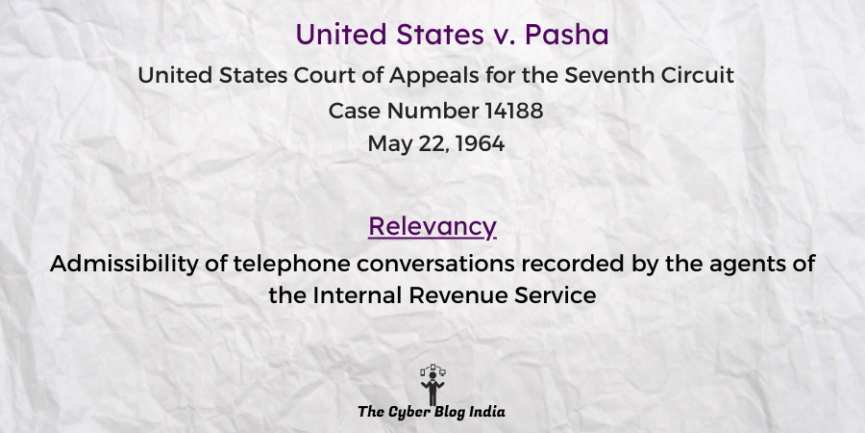United States v. Pasha

United States v. Pasha
332 F.2d 193
In the United States Court of Appeals for the Seventh Circuit
Case Number 14188
Before Chief Judge Hastings, Circuit Judge Schnackenberg, and Circuit Judge Swygert
Decided on May 22, 1964
Relevancy of the case: Admissibility of telephone conversations recorded by the agents of the Internal Revenue Service
Statutes and Provisions Involved
- The Internal Revenue Code, 26 U.S.C. § § 4401 (c), 4412 (a), 4412 (c), 6011 (a), 7203
- The Communications Act, 47 U.S.C. § 605
Relevant Facts of the Case
- The defendants were indicted for accepting wagers for themselves and others and not paying the special occupational tax on wagering for the taxable period.
- During their surveillance, the agents reported seeing the defendants entering and exiting the premises. While making calls, they either replied ‘yes’ when people asked about placing bets, impersonated the defendants and placed a bet or inquired about racing.
- During the trial, the defendants stated that these calls could not be considered evidence.
Prominent Arguments by the Counsels
- The plaintiff’s counsel argued that Section 7803(a) of the Internal Revenue Code authorised Internal Revenue agents to execute search warrants.
- The defendant’s counsel argued the inadequacy of count one since the ones on whose behalf the defendants acted are unlisted. Further, special agents from the Internal Revenue Service’s Intelligence Division couldn’t carry out search warrants.
Opinion of the Bench
- Telephonic conversations with unidentified people were admissible as circumstantial evidence.
- There was no error in the District Judge’s acceptance of the evidence, and the defendants’ contentions were not substantial.
Final Decision
- The court affirmed the judgement.
Risha Thomre Rajani, an undergraduate student at NMIMS Kirit P. Mehta School of Law, Mumbai, prepared this case summary during her internship with The Cyber Blog India in May/June 2023.
